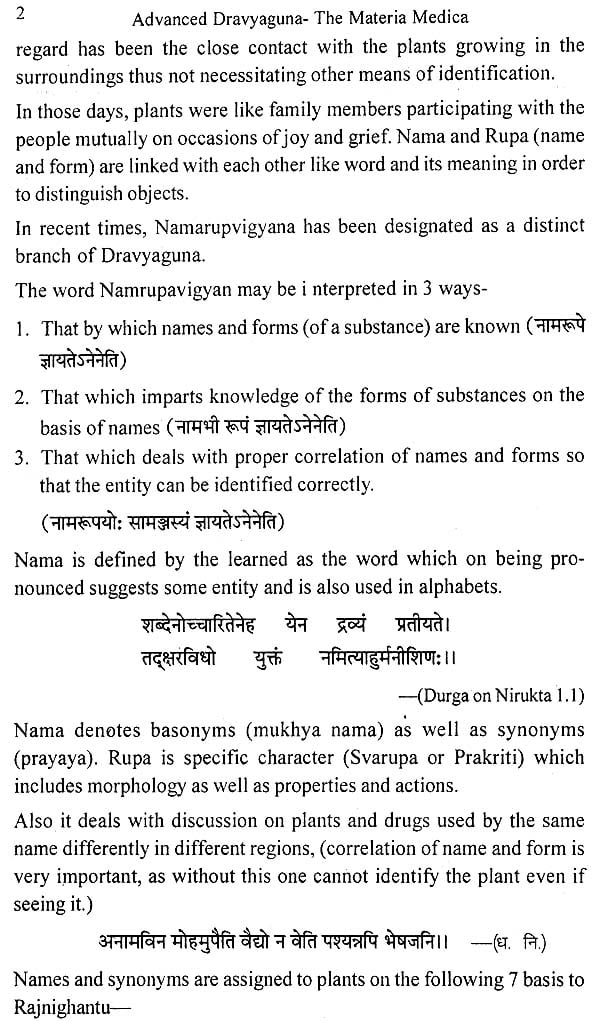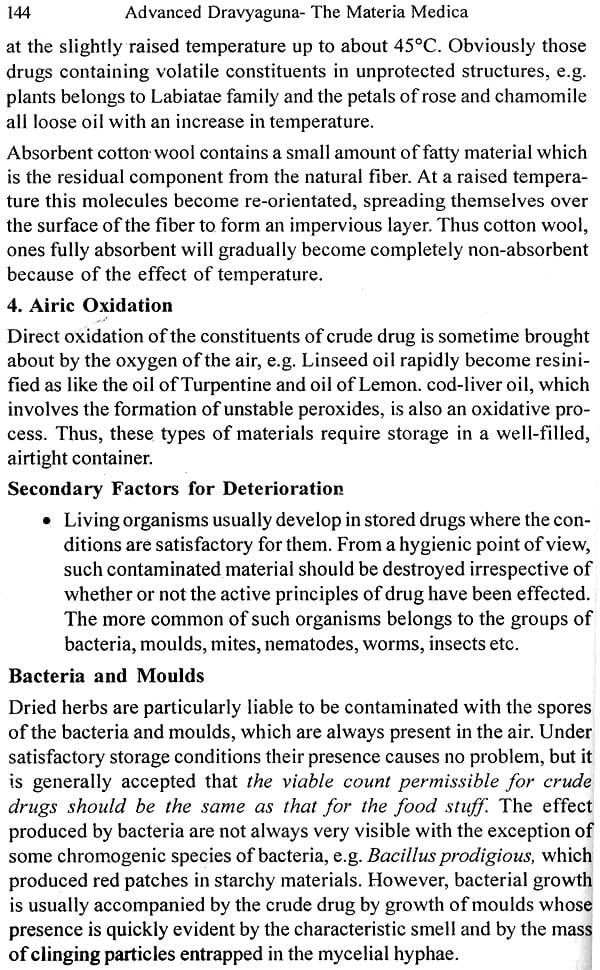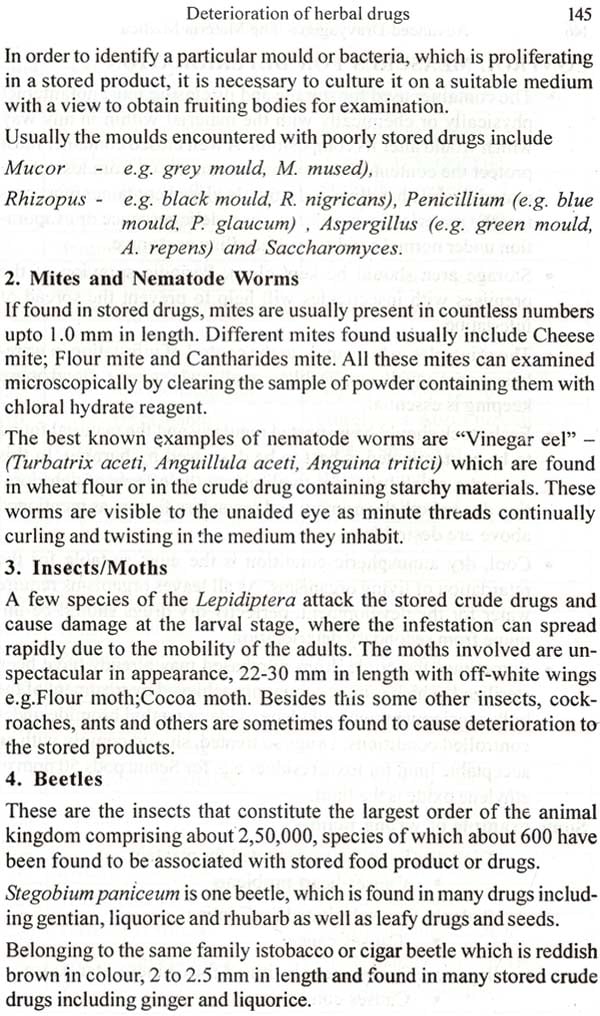
Advance Dravyaguna -The Materia Medica
Book Specification
| Item Code: | NAQ539 |
| Author: | Dr. Chandni Gupta |
| Publisher: | Chaukhambha Prakashan |
| Language: | English |
| Edition: | 2018 |
| ISBN: | 9789386735645 |
| Pages: | 184 |
| Cover: | PAPERBACK |
| Other Details | 8.00 X 5.00 inch |
| Weight | 200 gm |
Book Description
It gives me immense pleasure to write a foreword to the "Advanced Dravyaguna " authorized by Dr. Chadani Gupta . The Book is facilitating various modes of learning practices in Dravyaguna by considering attention to Dravyaguna and Ayurveda in current scenario. The book aptly presents a modern, luced and concise account of advancement in the field Dravyaguna is a branch Shastra. Most of the topic is explained in the form of tables , flow charts and diagrams to give clarity to the subject. Aushadha (a dravya) is one of the three pillar of all the eight branches of Ayurveda. Dravyaguna is a branch which explains the properties and safe usage of treasure of dravya especially of plant origin. But in present scenario many advanced topic such as Nutraceuticals, consmeceuticals , pharmacovigilance, pharmacogenomics, animal experiments etc. are incorporated in the field of Dravyaguna to make it more exientific and advanced . So this book is very helpful for all U.G. ,P.G. and Phd students and for teachers also as it gives concise and to the point explanation of a topic . The author need to be congratulated for her pioneering venture and it is hoped that many more books in this area will be brought in function.
| 1 | Importance of Namagyana of dravya | 1-4 |
| 2 | Anuktadravyas | 4-5 |
| 3 | Methods of standardisation and quality control | 6-11 |
| 4 | Pharmacognostical study of different parts of the plant | 11-15 |
| 5 | Knowledge of tissue culture techniques | 16-19 |
| 6 | Knowledge of genetically modified plants | 20-21 |
| 7 | Cultivation of medicinalplants | 21-27 |
| 8 | Knowledge of biodiversity | 28-30 |
| 9 | Endangered species | 30 |
| 10 | Knowledge of TKDL | 31-32 |
| 11 | Drugs and Cosmetic Act | 33-34 |
| 12 | Drugs and Magic remedies act (objectionable advertisements act 1954, rules 1955) | 35-36 |
| 13 | Intellectual property right | 36-43 |
| 14 | Regulations pertaining to import and export of Ayurvedic drugs | 43-47 |
| 15 | Basic concepts of pharmacology | 48-55 |
| 16 | Basic knowledge on experimental pharmacology | 55-57 |
| 16.1 | Analgesics | 57-59 |
| 16.2 | Antipyretics | 59-60 |
| 16.3 | Anti-inflammatory | 60-62 |
| 16.4 | Anti-diabetic | 62 |
| 16.5 | Anti-hypertensive | 63-64 |
| 16.6 | Anti-ulcer | 65 |
| 16.7 | Cardioprotective | 65-66 |
| 16.8 | Hepatoprotective | 66-67 |
| 16.9 | Diuretic | 67-68 |
| 16.10 | CNS activity | 68-70 |
| 16.11 | Anti-microbial | 70-71 |
| 17 | Knowledge of pharmacovigilance | 71-76 |
| 18 | Adverse drug reactions | 77-83 |
| 19 | Clinical pharmacology | 83-87 |
| 20 | Clinical drug research as per GCP guidelines | 88-92 |
| 21 | Pharmacogenomics | 92-97 |
| 22 | General awareness ofAharyogi (Neutraceuticals) | 97-104 |
| 23 | Soundaryaprasadana (cosmoceuticals) | 104-107 |
| 24 | Food additives | 107-109 |
| 25 | Excipients | 109-111 |
| 26 | Plant extracts | 111-114 |
| 27 | Food colours | 114-116 |
| 28 | Flavouring agents | 117-118 |
| 29 | Preservatives | 118-119 |
| 30 | API (Ayurvedic Pharmacopoeia of India) | 120-123 |
| 31 | BHP (british herbal pharmacopoeia 1996) | 123-124 |
| 32 | Reverse pharmacology' | 125-128 |
| 33 | Toxicological evaluation ofAyurvedic drugs | 129-133 |
| 34 | Evaluation of organized and unorganized drugs | 133-136 |
| 35 | Adulteration of herbal drugs | 137-142 |
| 36 | Deterioration of herbal drugs | 142-153 |
| 37 | Pharmacognosy | 154-163 |
| 38 | Probability of adverse drug interaction of few herbs with Anaesthetic drugs | 164-170 |
| 39 | Pharmacoepidemiology | 171-176 |
| Bibliography | 177 |
**Contents and Sample Pages**











